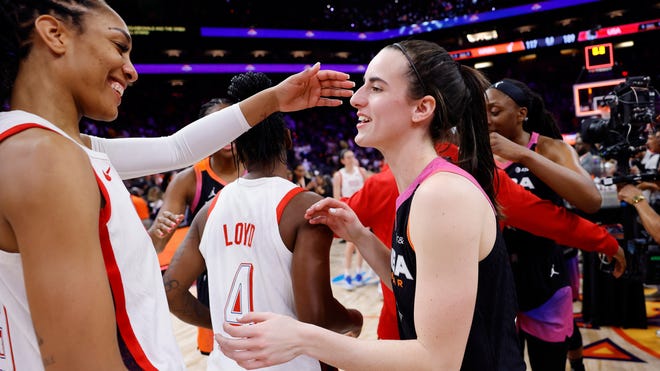Caitlin Clark, the rising star of women's basketball and a frontrunner for the 2024 WNBA Rookie of the Year award, is absent from the US women's basketball team at the Paris Olympics. While her omission has sparked outrage among casual fans captivated by her electrifying style of play, it's a decision that makes sense when considering the bigger picture.
Those familiar with the intricacies of women's basketball, both at the collegiate and professional levels, found Clark's absence unsurprising. For years, USA Basketball has prioritised aligning its Olympic training camps with the Euroleague schedule, which often means these "tryouts" occur during Euroleague breaks. This presents a logistical hurdle for college players, particularly those like Clark, who are in the midst of a demanding season. As a result, Clark never had the opportunity to truly showcase her skills alongside the established core of the US team.
While Clark's omission may seem like a missed opportunity for fans and the sport's growth, there are several compelling reasons why she was not selected.
1. A Lack of Earned Spot: Clark's schedule simply didn't align with the US training camp schedule. She never got the chance to play with this experienced group, who have been together for years.
2. Chemistry is Key: Building on-court rapport takes time, especially in a high-pressure environment like the Olympics. Clark, having never played alongside anyone on the current US roster, would be starting from scratch.
3. The Physicality of the International Game: The WNBA is a physical league, but the international game is even more intense. Clark's relatively slender frame might have been a disadvantage against the relentless physicality of FIBA competition, potentially leading to injury.
4. Turnovers are a Concern: Clark's high-risk, high-reward style of play, while effective in college and the WNBA, could lead to costly turnovers in the tightly contested Olympic setting.
5. Limited Senior Team Experience: While Breanna Stewart and Diana Taurasi were both selected for the Olympic team after college, they both had extensive experience with the senior national team, giving them a significant advantage over Clark.
6. Defence Remains a Weakness: Clark's offensive prowess is undeniable, but her defensive abilities are still developing. The demanding one-on-one nature of international play could have exposed this weakness.
7. The US Team Doesn't Need Her for Ratings: The US women's basketball team boasts a long history of viewership success, even before Clark's arrival. Their popularity is already established.
8. Tough Decisions: Who Gets Left Out? Selecting Clark would mean leaving out a deserving player. Her inclusion would likely have meant the omission of a veteran like Diana Taurasi, whose experience and leadership are invaluable to the team.
9. Minimal Playing Time: Even if Clark had been selected, her lack of familiarity with the team and the competition would likely have resulted in limited playing time.
10. A Generational Player Deserves More: Clark's talent deserves more than a token spot on the Olympic team. It's best for her future and the sport's long-term growth to wait for the 2028 Olympics, where she will be a more established and impactful player.
While Clark's absence from the Paris Olympics is undoubtedly a disappointment for some, it's a decision that reflects the complex realities of building a championship-level team. She remains a rising star with a bright future ahead, and her time on the world's biggest stage will undoubtedly come.
Article
Sports

Caitlin Clark's Olympic Snub: 10 Reasons Why She's Not in Paris

